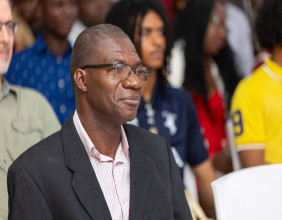However, ask any man who has beat back and survived prostate cancer, "What should other men know to protect their health from this disease," what would they recommend?
Prostate cancer survivors can be valuable teachers by sharing their firsthand experience and educating other men and their families on the importance of good health and what steps they can take. Men diagnosed with the disease and their loved ones are the best advocates for spreading awareness and support.
Here's the advice that men with prostate cancer and their loved ones should share to help other men prevent or detect it early:
• Know the risk factors for prostate cancer
Men should be aware of certain risk factors associated with this disease, including:
• Age – It’s rare before age 40, but risks increase significantly after age 50
• Family history – Men whose father or brother had prostate cancer have double the risk
• Ethnicity – For unclear reasons, African American men and Caribbean men of African ancestry have a higher risk
• Family history of women with breast and ovarian cancer
• High-fat diet
• Obesity
• Smoking
• Sedentary lifestyle
• Early detection and screening saves men’s lives
Early detection is crucial for prostate cancer, the second leading cause of cancer-related deaths among American men. A baseline PSA blood test starting at age 40 can diagnose the disease, but elevated levels can also stem from non-cancerous factors. Survivability increases by 98% with early detection. (1)
Please consult with your doctor about starting PSA testing at 40 and doing it annually. A digital rectal exam (DRE) is also necessary to detect prostate or prostate cancer abnormalities, despite some men's discomfort with it.
• Live a lifestyle that promotes cancer prevention
Adopting a healthy lifestyle can reduce the risk of prostate cancer recurrence by up to 33%. Studies show that one in three adults in the US can prevent cancer by following the following healthy habits: (2)
• Reach and maintain a healthy weight
• Be physically active most days of the week
• Eat a healthy diet rich in whole grains, fruits, vegetables, and beans
• Cut down on alcohol
• Use less salt
• Limit consumption of sugar-sweetened beverages
• Limit intake of red meat and processed meats
• Seek support from family and friends
Cancer patients need support. Express your feelings, research your options, and surround yourself with dependable people. Advocate for your health and collaborate with your medical team for the best care.
• Spread the word about prostate cancer awareness month
One more thing prostate cancer survivors will tell other men is to get the word out about this disease. It’s shocking how many men are not well-informed about prostate cancer. Men with prostate cancer should raise awareness by informing family members, co-workers, and friends about risk factors. Social media is another avenue of helping spread awareness.
The bottom line is that early diagnosis and treatment for prostate cancer saves lives.
References:
1). American Cancer Society information from the SEER (Surveillance, Epidemiology, and End Results) database
2). American Institute for Cancer Research
Dr. David Samadi is the Director of Men’s Health and Urologic Oncology at St. Francis Hospital in Long Island. He’s a renowned and highly successful board certified Urologic Oncologist Expert and Robotic Surgeon in New York City, regarded as one of the leading prostate surgeons in the U.S., with a vast expertise in prostate cancer treatment and Robotic-Assisted Laparoscopic Prostatectomy. Dr. Samadi is a medical contributor to NewsMax TV and is also the author of The Ultimate MANual, Dr. Samadi’s Guide to Men’s Health and Wellness, available online both on Amazon and Barnes & Noble. Visit Dr. Samadi’s websites at robotic oncology and prostate cancer 911.
David Samadi
Madison Urology
2123655000
email us here
Visit us on social media:
Facebook
Twitter
LinkedIn
Instagram
YouTube






